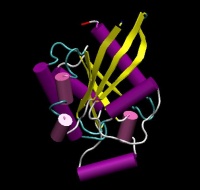Difference between revisions of "RhoA"
m (RhoA moved to RhoA (transglutaminase)) |
m |
||
| (4 intermediate revisions by one other user not shown) | |||
| Line 1: | Line 1: | ||
{| class="toccolours" border="1" style="float: left; clear: right; margin: 0 0 1em 1em; border-collapse: collapse;" | {| class="toccolours" border="1" style="float: left; clear: right; margin: 0 0 1em 1em; border-collapse: collapse;" | ||
| − | ! | + | ! {infobox header}| '''{{PAGENAME}}''' |
|- | |- | ||
| align="center" colspan="2" bgcolor="#ffffff" | [[Image:RhoA.JPG|200px|{{PAGENAME}}]] | | align="center" colspan="2" bgcolor="#ffffff" | [[Image:RhoA.JPG|200px|{{PAGENAME}}]] | ||
| Line 51: | Line 51: | ||
| Q63 is deamidated/transamidated by TG2 | | Q63 is deamidated/transamidated by TG2 | ||
| − | The transamidated protein has increased binding affinity to ROCK-2. The deamidated form (by cytotoxic dermonecrotizing factor or BTX) has decreased GTPase activity. | + | The transamidated protein has increased binding affinity to ROCK-2. |
| + | |||
| + | The deamidated form (by cytotoxic dermonecrotizing factor or BTX) has decreased GTPase activity. | ||
| + | |- | ||
| + | |Video | ||
| + | |{{#ev:dailymotion|19dSThNNq2NLtkXZ8|300}} | ||
|- | |- | ||
| − | | | + | | {infobox header} | |
|- | |- | ||
|} | |} | ||
[[Category:Tissue transglutaminase|*]] | [[Category:Tissue transglutaminase|*]] | ||
| + | [[Category:Deamidase|*]] | ||
Latest revision as of 11:54, 10 March 2015
| RhoA | |
|---|---|

| |
| Substrate peptide name | RhoA |
| Synonyms | - |
| Determination type | In situ/In vitro |
| Source | Homo sapiens |
| Subcellular localization | Cytoskeleton |
| Swissprot ID | P61586 |
| Reactive glutamines | Q52, Q63, Q136 |
| Reactive lysines | - |
| Substrate sequence | EVDGKQVELAL
WDTAGQEDYDR LAKMKQEPVKP |
| Structure | 1A2B |
| Surface accessibility | ASAView pdf
ASAView txt |
| Disorder prediction | IUPred |
| Reference | PMID:9593707 |
| Notes | Q63 is deamidated/transamidated by TG2
The transamidated protein has increased binding affinity to ROCK-2. The deamidated form (by cytotoxic dermonecrotizing factor or BTX) has decreased GTPase activity. |
| Video | 19dSThNNq2NLtkXZ8|300}} |